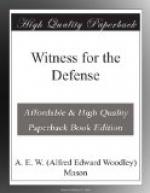Thresk watched the case from his rooms at the Taj Mahal Hotel. Every fact which was calculated to arouse sympathy for her was also helping to condemn her. No one doubted that she had shot Stephen Ballantyne. He deserved shooting—very well. But that did not give her the right to be his executioner. What was her defence to be? A sudden intolerable provocation? How would that square with the dragging of his body across the carpet to the door? There was the fatal insuperable act.
Thresk read again and again the reports of the proceedings for a hint as to the line of the defence. He got it the day when Repton appeared in the witness-box on a subpoena from the Crown to bear testimony to the violence of Stephen Ballantyne. He had seen Stella with her wrist bruised so that in public she could not remove her gloves.
“What kind of bruises?” asked the counsel.
“Such bruises as might be made by some one twisting her arms,” he answered, and then Mr. Travers, a young barrister who was enjoying his first leap into the public eye, rose to cross-examine.
Thresk read through that cross-examination and rose to his feet. “You cannot control the price you will have to pay,” he said to himself. That day, when Mrs. Ballantyne’s solicitor returned to his office after the rising of the Court, he found Thresk waiting for him.
“I wish to give evidence for Mrs. Ballantyne,” said Thresk—“evidence which will acquit her.”
He spoke with so much certainty that the solicitor was fairly startled.
“And with evidence so positive in your possession it is only this afternoon that you come here with it! Why?”
Thresk was prepared for the question.
“I have a great deal of work waiting for me in London,” he returned. “I hoped that it might not be necessary for me to appear at all. Now I see that it is.”
The solicitor looked straight at Thresk.
“I knew from Mrs. Repton that you dined with the Ballantynes that night, but she was sure that you knew nothing of the affair. You had left the tent before it happened.”
“That is true,” answered Thresk.
“Yet you have evidence which will acquit Mrs. Ballantyne?”
“I think so.”
“How is it, then,” the lawyer asked, “that we have heard nothing of this evidence at all from Mrs. Ballantyne herself?”
“Because she knows nothing of it,” replied Thresk.
The lawyer pointed to a chair. The two men sat down together in the office and it was long before they parted.




